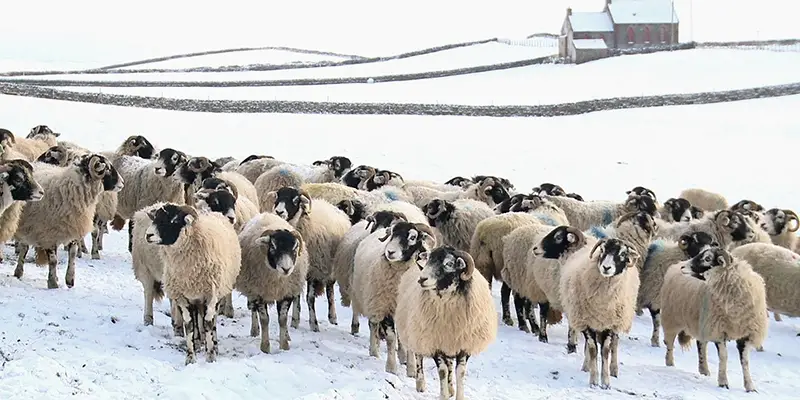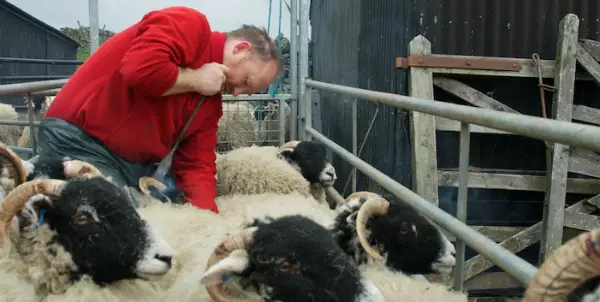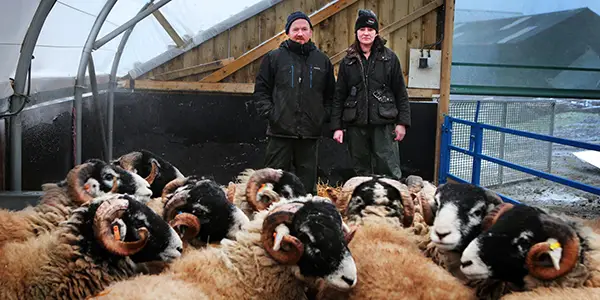ADDICTED TO SHEEP: A Remarkable Ode To Farmers Everywhere

Becky spends her days working in TV and she spends…
In the very North of England, settled into the cinematic hillside of the North Pennines, there lives a family of sheep farmers. Amongst the snow, the wind, and the dying local farm industry, this small family battles every day to rear the perfect sheep and to pursue the life they have always dreamed of.
Meet the Hutchinsons – the stars of quirky documentary Addicted to Sheep. This unique and insightful film allows us to peer into a year in the life of struggling sheep farmers. From a breached birth to winning gold at the local fair for their prize-winning sheep, Addicted to Sheep is a simple yet warmhearted look at a life that most of us city dwellers can hardly believe exists.
This is the first feature documentary from Magali Pettier, and it provides a wonderful perspective into the lives of the Hutchinson family.
Counting Sheep
In style, Addicted to Sheep is fairly reminiscent of documentaries like Etre et Avoir – very pure, poetic and observational. The voice of the filmmaker is not heard, and although Pettier’s presence is clearly felt (as with any documentary), we do not hear her questions. We hear only the voice of the Hutchinsons, making it far more powerful. The narrative comes straight from their mouths, and the film has an incredibly authentic feel.
Technically, Addicted to Sheep is rough, and the camerawork is unpolished. This is the documentary’s strength, however, as these sequences play out unmanipulated. Pettier is a fan of wide shots, which nestle the farmhouse amongst the snowy hills in winter and the green grass in summer. Despite its roughness, it’s extremely beautiful and does a fantastic justice to the English countryside. The scale on-screen also reminds us just how isolating farming can be, and that the Hutchinsons are only a small family of farmers – almost lost in the landscape.

One of the most harrowing sequences involves a ‘yow’ (female sheep) giving birth to a lamb. As we see, the birth is breached and we watch as Tom does his best to save the lamb. The reality is grim, and the action worse. Pettier doesn’t shy away from this, however hard it is for us to watch (it’s very hard on the big screen, trust me). The harsh and quite frankly gross day-to-day lives of farmers is a shock to sheltered audiences, but serves to ensure that Addicted to Sheep isn’t trying to romanticise farming.
It is also a complete testament to Magali Pettier as a director with regards to the amount of trust and access that the Hutchinsons allowed throughout the film. Pettier‘s filming of the Hutchinson children individually allow us to engage with them, and to see their hopes and aspirations. There is an immense bond between them and the camera which allows us to be submerged in their world. The editing too has ensured that the film reads like a visual poem – gentle, but firm in its purpose.
Simple & Immersive
Pettier‘s background and upbringing as a farmer’s daughter shines through, as at some points Addicted to Sheep does feel a little too much like a love story to farming, and less like an exploration. The film suffers, in a way, from an awful catch 22. The thing that makes it wonderful – its simplicity and lyrical quality – is also the thing which may make it boring for some viewers.
It’s true there is little drama. Most of the film is simple observation and reaction. It is not exploitive or judgemental, and this is something which may be lost on audiences of today who are used to big explosions, car chases and shocking revelations. That’s not to say that the film doesn’t have an audience (it has done incredibly well on the festival scene), but it will be interesting to see how Addicted to Sheep fits in with the contemporary film market.

What begins as a series of shots of animals on a farm, intercut with the day-to-day tasks performed by Tom and his family, ends up as a powerful documentary inviting us to think about family, sustainability, capitalism and of course, sheep. The film feels heavily inspired by the observational Look at Life type programmes that prevailed in 1960s Britain, except without the posh voiceover and less superiority. Those programmes were designed to teach us about lives we hadn’t encountered, which is exactly what Addicted to Sheep tries to do – but in a far more entertaining and less patronising way.
The film also taps into contemporary issues which farmers face, particularly on the economic side. The Hutchinsons are tenant farmers, which is radically different from the traditional ideas we have about the occupation. Farming is seen as an almost archaic and outdated profession, and farmers are seen as people who have inherited farms and animals without much of a choice. Tom and Kay, however, do not own their farm and have a rental period of fifteen years, with the potential to extend.
This results in enormous economic issues for the couple: if the sheep don’t produce or sell, then they can barely put food on the table. By including this angle, Addicted to Sheep becomes a comment on how destructive capitalism can be to local business, and how exploitative the food industry is to independent farmers. Tom and Kay’s love for farming and their year-round struggles are ultimately heartwarming, but the film never lets you forget that this may not last forever.
Truly Unique
Despite its roughness and lack of ‘drama’, Addicted to Sheep truly embodies the nature of the ob-doc. The pacing is terrific, and we feel part of the family from the beginning to the end. Pettier‘s choice to focus solely on one family (she had originally filmed several farming families in the area) means that we develop a close connection to Tom, Kay and their children.
Beyond everything else though, it’s a smart and funny film; from watching daughter Hetty attempt to close the barn doors alone, to listening to the children in the school classroom discuss their favourite parts of farming, to Kay shouting at one of the sheepdogs. It is a funny film which showcases the oddities of everyday life. This just happens to be a life that most of us don’t see.
What’s your favourite observational documentary?
Addicted to Sheep is currently in selected UK Cinemas and will be released on DVD in the new year. For more information on screenings outside of the UK, see here.
https://vimeo.com/109492001Does content like this matter to you?
Become a Member and support film journalism. Unlock access to all of Film Inquiry`s great articles. Join a community of like-minded readers who are passionate about cinema - get access to our private members Network, give back to independent filmmakers, and more.
Becky spends her days working in TV and she spends every other minute writing about cinema, TV & feminism. Based in London, she also likes drinking gin, re-watching 'The X Files' and writing about on-screen representation and all manner of things over at femphile.com













